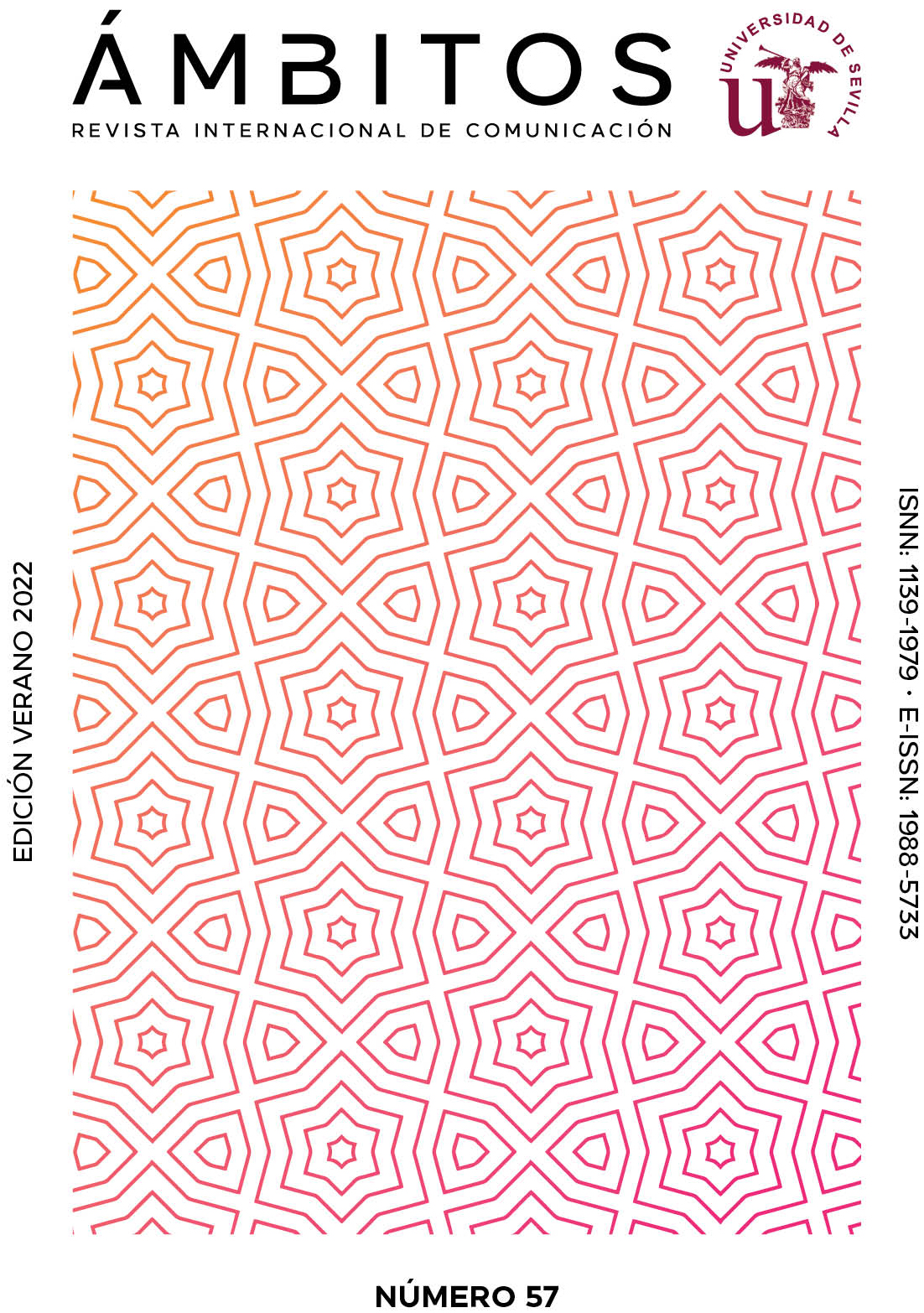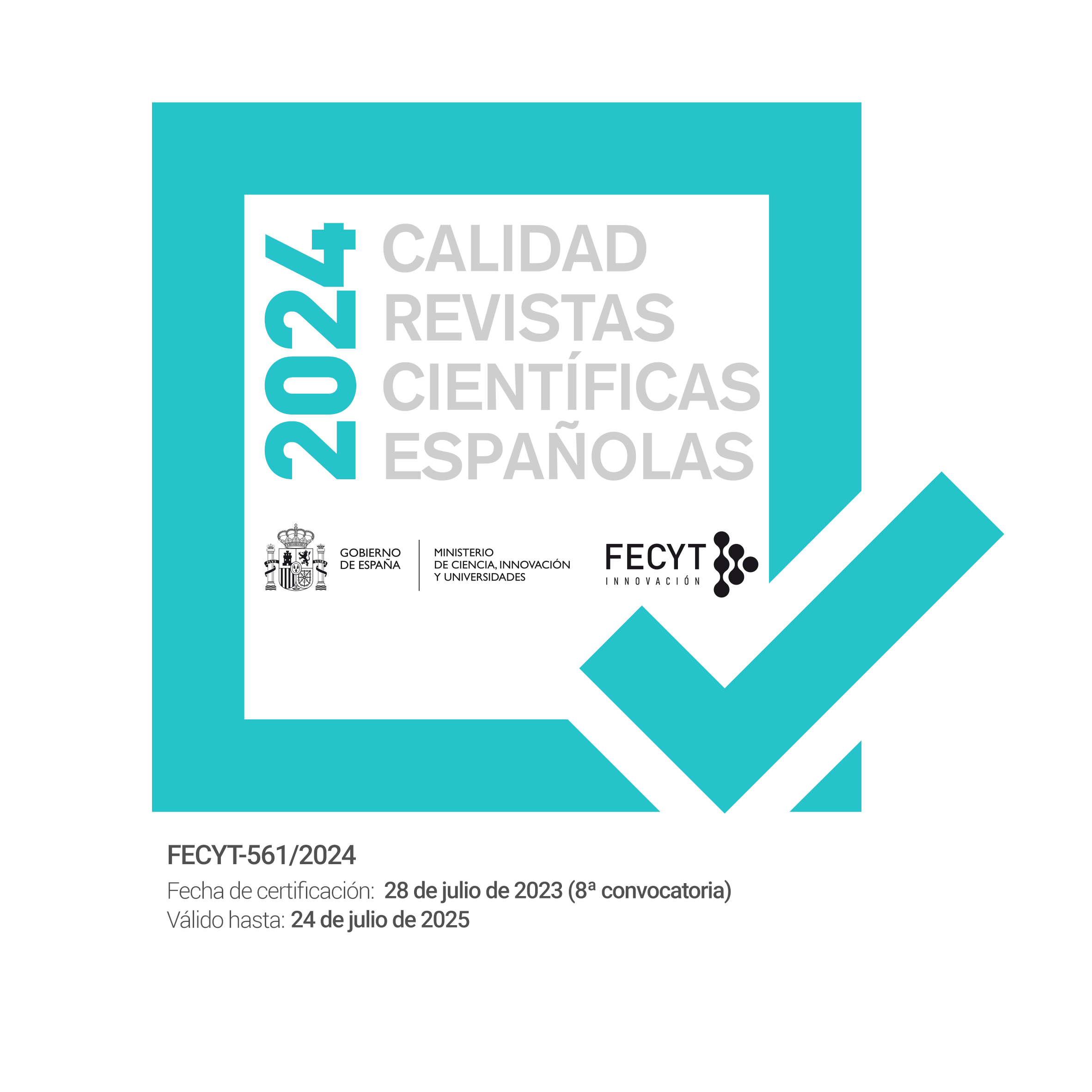Observatórios extremistas & fake news: imprensa e democracia sob ataque
DOI:
https://doi.org/10.12795/Ambitos.2022.i57.02Palabras clave:
imprensa, democracia, fake news, observatórios, mídiaResumen
A partir de uma ótica onde se entende que Observatórios e Projetos de Crítica de Mídia contribuem para o fortalecimento da democracia e o exercício da cidadania, e tomando como inspiração a abordagem relacional entre democracia, desinformação e conceitos clássicos do jornalismo, este artigo tem como objetivo a análise desses elementos e como se conectam. Se espaços de crítica de mídia podem ser usados como instrumentos para o fortalecimento da democracia e o exercício da cidadania, então é preciso compreender que tipo de debate está sendo realizado nesses espaços. Nos últimos anos, surgiram iniciativas de observação midiática ligadas a ideologias de partidos de extrema direita. Esses espaços que flertam com autoritarismo e o fascismo acabam assumindo um papel de Media Watch, mesmo que não se reconheçam como canais de crítica de mídia. Estes ditos canais atuam como observatórios de prática. São sites, blogs e redes sociais, ligados a movimentos de extrema direita, nos quais os autores utilizam de conceitos clássicos do jornalismo para promover ataques à imprensa e à democracia. Cobram imparcialidade e até direito de resposta quando publicadas notícias falsas. Nesse contexto, as reflexões propostas podem indicar que o jornalismo deve assumir um lado, sem espaço para desinformação, principalmente quando as instituições democráticas estiverem em xeque. Ainda que exista todo um debate sobre qual democracia os meios defendem e o que se entende por democracia.
Descargas
Citas
Albornoz, L. A. & Herschmann, M. (2006). Os observatórios ibero-americanos de informação, comunicação e cultura: balanço de uma breve trajetória. E-Compós, 7(3), 1-20. https://bit.ly/3lYhZHC
BARRETO, I. (2020, 24 de setembro) Mesa Redonda: Observatórios de mídia: crítica, educação e cidadania. Youtube. https://bit.ly/3t1pzVK
Bittencourt, W. C., & Silva, G. (2015). Apontamentos históricos sobre crítica noticiosa. Novos Olhares, 4(2), 6-18. https://bit.ly/3aA69RH
Castro, P. (2021, 18 de outubro). Discorde do establishment e seja caçado pelo STF e pela mídia: notas rápidas. Mídia Sem Máscara. https://bit.ly/3wZf7jS
Christofoletti, R. (2006). Observatorio de medios: un caso brasileño. Revista Latinoamericana Comunicación Chasqui, 95, 40-45. https://bit.ly/38REJ9n
Davidson, J. (2021, 4 de janeiro). O mundo infernal do “jornalismo moderno”. Mídia Sem Máscara.
Derosa. C. (2021, 27 de janeiro). Covid-19: Terror midiático e boicote à prevenção eleva número de mortes e internações. Mídia Sem Máscara. https://bit.ly/3GvQPkN
Duarte, M. Y. M. (2012). Estudo de caso. In J. Duarte & A. Barros. (orgs), Métodos e técnicas de pesquisa em comunicação. Atlas.
Editoria MSM. (2021, 7 de fevereiro). Amanda Klein, palhaços do UOL e a mídia-fiasco: notas rápidas. Mídia Sem Máscara. https://bit.ly/3NKuUIZ
Editoria MSM. (2020, 17 de dezembro). Punidos por fake news: após caso Folha/Hang, UOL também é condenado. Mídia Sem Máscara. https://bit.ly/3wXs909
Editoria MSM. (2020, 6 de novembro). Cristofobia midiática: negacionismo sistêmico deixa o fenômeno ainda mais óbvio. Mídia Sem Máscara. https://bit.ly/3Ni5DpX
Editoria MSM. (2020, 16 de julho). Coronavírus e mídia: na frontpage do UOL, tudo para assustar o leitor. Mídia Sem Máscara. https://bit.ly/3wW34CM
Henriques. R. P. (2014). Linguagem, verdade e conhecimento. EDUFES.
Montúfar F. C. (2011). Observatorios: fortalecimiento de la libertad de expresión y reivindicación del derecho a la crítica. Revista Latinoamericana Comunicación Chasqui, 116, 48 -54.
Paulino, F. O., Oliveira, M. & Faria, Jairo. (2017) Ombudsmen e observatórios de média: proximidades e diversidades. Revista internacional de Comunicación y Desarrollo, 6, 69-81, ISSN e2386-3730.
Pena. F. (2007). Teorias do jornalismo. Contexto.
Puggina, P. (2022, 22 de fevereiro). STF e a velha mídia: A balança da Justiça no Inmetro. Mídia Sem Máscara. https://bit.ly/3aA730x
Puggina, P. (2021, 29 de janeiro). Bolsonaro, Covid-19 e as trapaças da mídia militante. Mídia Sem Máscara. https://bit.ly/3wYQXGg
Puggina, P. (2020, 18 de agosto). Covid-19: as mentiras da mídia num país de muitas doenças. Mídia Sem Máscara. https://bit.ly/3z4UtjZ
Rebouças, E., & Cunha P. (2010). Observatório de mídia como instrumentos para (da) democracia. Revista Eletrônica de Comunicação, Informação e Inovação em Saúde, 4(4), 85-93. https://bit.ly/3N4duaq
Schudson, M. (2010). Descobrindo a notícia: uma história social dos jornais nos Estados Unidos. Vozes.
Segurado, R. (2021). Desinformação e democracia: a guerra contra as fake news na internet. Hedra.
Teixeira, P.F., & Filho, A.F. (2021). O <> e a desinformação. In Segurado, R., Silveira, S. A., & Penteado. (org). Ativismo Digital. Política e cultura na era das redes.
Wardle, C., & Derakhshan, H. (2017). Information Disorder: toward an interdisciplinary framework for research and policy making. Council of Europe.
Wood, D., & Brumfiel, G. (2021, 5 de dezembro). Pro-Trump counties now have far higher COVID death rates. Misinformation is to blame. NPR. https://n.pr/3LVLp3v
Descargas
Publicado
Cómo citar
Número
Sección
Licencia
Derechos de autor 2022 Fernando Oliveira Paulino, Mariana Martins de Carvalho, Luma Poletti Dutra, kariane costa silva de oliveira

Esta obra está bajo una licencia internacional Creative Commons Atribución-NoComercial-CompartirIgual 4.0.
Ámbitos. Revista Internacional de Comunicación es una revista de acceso abierto, lo que significa que todo su contenido está disponible gratuitamente para el usuario o su institución. Los usuarios pueden leer, descargar, copiar, distribuir, imprimir, buscar o enlazar con el texto completo de los artículos, o utilizarlos para cualquier otro fin lícito, sin solicitar permiso previo al editor o al autor. Esta definición de acceso abierto se ajusta a la Iniciativa de Acceso Abierto de Budapest (BOAI).

A menos que se indique lo contrario, todo el contenido de la edición electrónica se distribuye bajo una " licencia internacional Creative Commons Attribution-NonCommercial-ShareAlike 4.0 ". Puede consultar la versión informativa y el texto legal de la licencia aquí. Esto debe indicarse expresamente de esta manera cuando sea necesario.
En caso de aceptación del manuscrito, los autores ceden los derechos de la obra para su publicación a Ámbitos. Revista Internacional de Comunicación bajo el contrato de licencia Reconocimiento-NoComercial-CompartirIgual 4.0 Internacional (CC BY-NC-SA 4.0). Los autores conservan los derechos de autor y terceros están autorizados a copiar, distribuir y hacer uso de la obra, siempre que cumplan con los términos y condiciones establecidos en la licencia.
- Citar la autoría y la fuente original de publicación (revista, editorial y URL de la obra).
- No los utilice con fines comerciales.
- Si remezcla, transforma o crea a partir del material, debe publicar sus contribuciones bajo la misma licencia que el original.
Se puede encontrar más información en https://creativecommons.org/licenses/by-nc-sa/4.0/deed.es



















